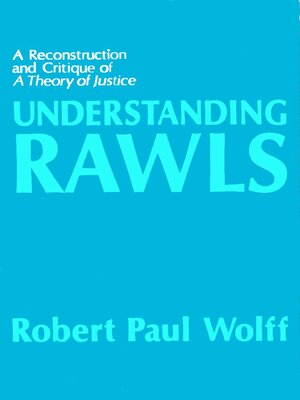Understanding Rawls
ebook ∣ A Reconstruction and Critique of A Theory of Justice
By Robert Paul Wolff

Sign up to save your library
With an OverDrive account, you can save your favorite libraries for at-a-glance information about availability. Find out more about OverDrive accounts.
Find this title in Libby, the library reading app by OverDrive.



Search for a digital library with this title
Title found at these libraries:
| Library Name | Distance |
|---|---|
| Loading... |
Since its publication in 1971, John Rawls' A Theory of Justice has been the subject of a lively debate among philosophers, economists, and political scientists. In this book, Robert Paul Wolff provides an interpretation and critique of Rawls' theory that both clarifies it and reveals its basic flaws.
According to Professor Wolff, Rawls' device of a bargaining game among self-interested parties is designed to solve Kant's problem of deriving substantive moral and political principles from purely formal criteria of rationality. This book traces the ever-greater complications introduced by Rawls into his theory to overcome weaknesses and respond to critics. Once he has reconstructed Rawls' theory to exhibit its underlying structure, Professor Wolff subjects it to a series of fundamental criticisms and shows where it fails by appealing to economic, psychological, and sociological considerations, as well as to those of philosophy.
Understanding Rawls contends that Rawls' approach to social philosophy – by way of formal models of game theory and welfare economics – is fundamentally misguided. The bargaining "theorem" sketched by Rawls is shown to be invalid, and the author suggests that a different mode of analysis, owing more to the legacies of Marx and Freud, would be more fruitful in the search for a usable conception of social justice.







